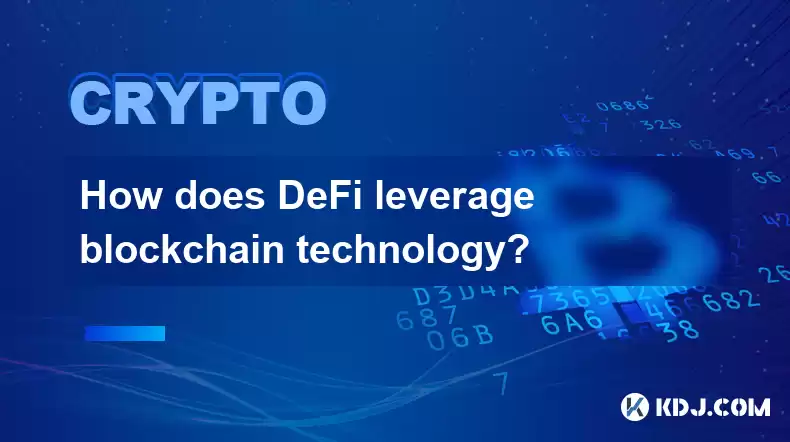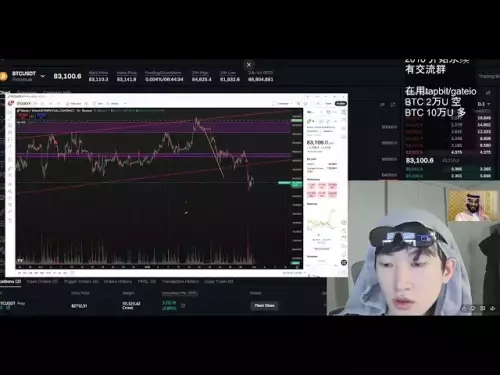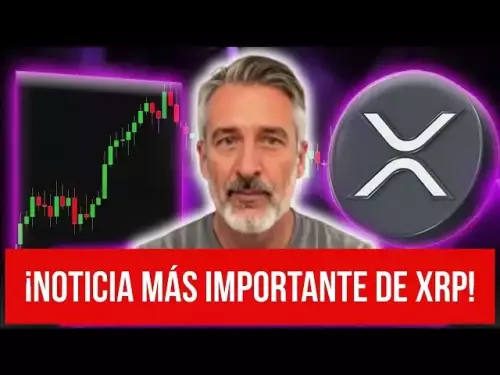-
 bitcoin
bitcoin $87959.907984 USD
1.34% -
 ethereum
ethereum $2920.497338 USD
3.04% -
 tether
tether $0.999775 USD
0.00% -
 xrp
xrp $2.237324 USD
8.12% -
 bnb
bnb $860.243768 USD
0.90% -
 solana
solana $138.089498 USD
5.43% -
 usd-coin
usd-coin $0.999807 USD
0.01% -
 tron
tron $0.272801 USD
-1.53% -
 dogecoin
dogecoin $0.150904 USD
2.96% -
 cardano
cardano $0.421635 USD
1.97% -
 hyperliquid
hyperliquid $32.152445 USD
2.23% -
 bitcoin-cash
bitcoin-cash $533.301069 USD
-1.94% -
 chainlink
chainlink $12.953417 USD
2.68% -
 unus-sed-leo
unus-sed-leo $9.535951 USD
0.73% -
 zcash
zcash $521.483386 USD
-2.87%
Defi如何利用区块链技术?
DeFi leverages blockchain's immutability and transparency, enabling secure, automated transactions via smart contracts on decentralized exchanges and lending platforms, creating a trustless financial ecosystem.
2025/03/13 13:20

- DEFI应用程序依靠智能合约来自动化和无信任。
- 区块链的不变性和透明度可确保安全和可验证的交易。
- 分散的交易所(DEX)提供没有中介机构的点对点交易。
- 贷款和借贷平台利用区块链进行抵押和风险管理。
- Defi协议利用区块链创建和管理各种金融工具。
Defi如何利用区块链技术?
分散的金融(DEFI)是一个快速增长的行业,旨在利用区块链技术的独特特性以分散的方式重新中心地重新创建传统金融服务。这种革命性的方法消除了对银行和经纪人等中介人的需求,从而提高了透明度,效率和可及性。 DEFI功能的核心取决于其与区块链固有功能的无缝集成。
区块链技术是Defi的整个结构的基础。其分布式分类帐系统可确保透明度,使任何人都可以在公共网络上查看交易。这种开放且可验证的自然促进了参与者之间的信任,从而减轻了与集中系统相关的风险。区块链的不变性阻止了过去交易的改变,从而确保了偏见生态系统的完整性。
智能合约是发动机驱动DEFI应用程序。这些自我执行的合同编码为区块链,自动化贷款,借贷和交易的过程,消除了中介机构执行协议的需求。智能合约根据预定义的规则自主运行,以确保交易准确透明地执行。
去中心化交换(DEX)是Defi利用区块链的主要例子。与集中式交流不同,DEXS在不依靠中央权威的情况下直接促进用户之间的点对点交易。这可以消除单个失败点,并降低审查或操纵的风险。交易过程是通过智能合约自动化的,从而提高了速度和效率。
Defi空间中的贷款和借贷平台在很大程度上利用了区块链的功能。这些平台允许用户使用区块链进行抵押管理和风险评估,借用或借用加密货币。智能合约会自动执行贷款协议,确保及时偿还并最大程度地降低对手风险。区块链的透明度使贷方可以监视抵押品和借款人的信誉。
Stablecoins是DEFI的关键组成部分,通常被固定在诸如美元之类的法定货币上,并且经常在区块链网络上发行。与其他加密货币相比,这种稳定的价值降低了波动性,并在Fefi生态系统内实现了平滑的交易。区块链的透明度和可审核性有助于维持这些资产的稳定性和信誉。
DEFI协议利用区块链创建和管理各种金融工具。其中包括模仿传统资产(如股票或商品)的合成资产,可在没有直接所有权的情况下向这些市场提供接触。在区块链上创建和交易这些工具的能力为Defi空间内的创新和多元化打开了新的机会。
DEFI协议的安全性至关重要。尽管区块链固有的安全功能为稳固的基础提供了坚实的基础,但仍可以利用智能合约中的漏洞。严格的审计和安全性最佳实践对于减轻这些风险至关重要。许多DEFI协议的开源性质可实现社区审查,进一步加强安全性。
区块链网络的可扩展性也是Defi开发的关键因素。高交易费用和缓慢的处理速度可能会阻碍DEFI应用的采用和增长。正在进行的研究和开发集中在提高可扩展性上,以确保Defi生态系统的效率和可访问性。
Defi周围的监管景观仍在发展。全世界政府正在努力分散财务的影响,并正在努力建立适当的监管框架。调节性不确定性给偏见空间的长期增长和稳定带来了挑战。
常见问题:问:在DEFI中使用区块链有什么优点?答:区块链提供了几个优势,包括通过智能合约提高透明度,不变性,安全性和自动化。它消除了对中介人的需求,降低成本并提高效率。
问:Defi如何确保安全?答:DEFI依赖于区块链的固有安全功能,但还采用了智能合约,当经过精心设计和审核时,可以最大程度地减少漏洞。但是,智能合同脆弱性仍然是一个关注的问题,需要持续的警惕。
问:与DEFI有哪些风险?答:风险包括智能合同漏洞,加密货币的波动,监管不确定性以及黑客和骗局的潜力。用户应进行彻底的研究并了解参加DEFI之前所涉及的风险。
问:Defi与传统金融有何不同?答:与依靠集中式中介机构的传统财务不同,Defi是分散,透明且无许可的。 DEFI在区块链上运行,提供提高效率和可访问性。
问:Defi的未来是什么?答:Defi的未来是不确定的,但具有巨大的潜力。可伸缩性,法规清晰度以及新技术集成的持续发展可能会导致广泛采用并改变金融格局。
免责声明:info@kdj.com
所提供的信息并非交易建议。根据本文提供的信息进行的任何投资,kdj.com不承担任何责任。加密货币具有高波动性,强烈建议您深入研究后,谨慎投资!
如您认为本网站上使用的内容侵犯了您的版权,请立即联系我们(info@kdj.com),我们将及时删除。
- 比特币的坎坷之路:通胀飙升、降息希望破灭、数字黄金争论升温
- 2026-02-01 09:40:02
- 比特币显示出更便宜的数据信号,分析师关注黄金轮动
- 2026-02-01 07:40:02
- 比特币的最新暴跌:这是加密货币的终极“逢低买入”信号吗?
- 2026-02-01 07:35:01
- 大苹果加密货币蓝调:5000 亿美元在宏观经济旋风中消失,比特币和以太坊陷入困境
- 2026-02-01 07:35:01
- 迈克尔·鲁贝尔 (Michael Wrubel) 荣获 IPO Genie,成为下一个大预售:区块链早期投资的新时代
- 2026-02-01 07:30:02
- XRP、瑞波币、支持水平:在加密货币波动的城市丛林中航行
- 2026-02-01 06:35:01
相关百科

什么是 DeFi 中的 Delta 中性策略?
2026-01-04 03:20:00
了解 Delta 中性定位1. DeFi 中的 Delta 中性策略是指一种投资组合配置,其中对标的资产价格变动的整体敏感度故意平衡为零。 2. 这种平衡是通过持有相互抵消的多头和空头头寸(通常涉及现货资产、期权或永续期货)来实现的,因此微小的价格变化不会对投资组合的价值产生重大影响。 3. 与传统...

如何在块资源管理器上跟踪Defi活动
2025-09-04 17:36:52
Bitcoin在分散财务中的作用1。Bitcoin仍然是加密货币生态系统的基石,既是价值存储,也是市场情绪的基准。其2100万枚硬币的供应有限,加剧了稀缺性,这一原则是其长期上诉的基础。交易者和机构在评估更广泛的市场趋势时通常是指Bitcoin的价格变动。 2。尽管Bitcoin最初不是为复杂的智能...

DEFI和CEFI有什么区别?一篇文章分析了两者的优势和缺点
2025-06-13 03:57:17
了解Defi和Cefi的基础要完全掌握Defi(分散融资)和CEFI(集中式财务)之间的差异,必须了解其基础结构。 DEFI在区块链技术上运行,主要使用智能合约在没有中介机构的情况下执行金融服务。相比之下,CEFI平台的功能更像传统银行,但针对加密货币资产量身定制。这些平台依靠集中当局来管理交易,监...

什么是defi?如何平衡风险和回报?
2025-05-31 12:22:13
什么是defi?如何平衡风险和回报?分散的金融(通常称为DEFI )代表了金融生态系统的革命性转变,利用区块链技术创建开放,无许可和透明的金融服务网络。与依靠银行等集中式机构的传统金融不同,Defi在以太坊等公共区块链上运营,使用户能够在没有中介机构的加密货币中借入,借用,贸易和赚取利息。 Defi...

Defi贷款如何工作?与传统银行贷款有什么区别?
2025-05-29 17:36:14
Defi贷款简介Defi贷款或分散的财务贷款代表了进行借贷和贷款的革命性转变。与传统的银行贷款不同,Defi Lending在区块链技术上运作,提供了一种分散,透明且通常更容易获得的财务方法。本文将探讨Defi贷款的机制,并突出与传统银行贷款的关键差异。 Defi贷款的工作方式Defi贷款利用区块链...

Defi安全吗?分散财务的机遇和挑战
2025-05-27 14:28:20
分散的财务(通常称为Defi )通过提供一系列金融服务而无需银行等传统中介机构,彻底改变了金融格局。与任何创新技术一样,安全问题至关重要。本文深入研究了DEFI带来的机遇和挑战,提供了全面的概述,以帮助您了解Defi是否安全。了解Defi及其核心原则DEFI主要采用区块链技术(主要是以太坊)来创建开...

什么是 DeFi 中的 Delta 中性策略?
2026-01-04 03:20:00
了解 Delta 中性定位1. DeFi 中的 Delta 中性策略是指一种投资组合配置,其中对标的资产价格变动的整体敏感度故意平衡为零。 2. 这种平衡是通过持有相互抵消的多头和空头头寸(通常涉及现货资产、期权或永续期货)来实现的,因此微小的价格变化不会对投资组合的价值产生重大影响。 3. 与传统...

如何在块资源管理器上跟踪Defi活动
2025-09-04 17:36:52
Bitcoin在分散财务中的作用1。Bitcoin仍然是加密货币生态系统的基石,既是价值存储,也是市场情绪的基准。其2100万枚硬币的供应有限,加剧了稀缺性,这一原则是其长期上诉的基础。交易者和机构在评估更广泛的市场趋势时通常是指Bitcoin的价格变动。 2。尽管Bitcoin最初不是为复杂的智能...

DEFI和CEFI有什么区别?一篇文章分析了两者的优势和缺点
2025-06-13 03:57:17
了解Defi和Cefi的基础要完全掌握Defi(分散融资)和CEFI(集中式财务)之间的差异,必须了解其基础结构。 DEFI在区块链技术上运行,主要使用智能合约在没有中介机构的情况下执行金融服务。相比之下,CEFI平台的功能更像传统银行,但针对加密货币资产量身定制。这些平台依靠集中当局来管理交易,监...

什么是defi?如何平衡风险和回报?
2025-05-31 12:22:13
什么是defi?如何平衡风险和回报?分散的金融(通常称为DEFI )代表了金融生态系统的革命性转变,利用区块链技术创建开放,无许可和透明的金融服务网络。与依靠银行等集中式机构的传统金融不同,Defi在以太坊等公共区块链上运营,使用户能够在没有中介机构的加密货币中借入,借用,贸易和赚取利息。 Defi...

Defi贷款如何工作?与传统银行贷款有什么区别?
2025-05-29 17:36:14
Defi贷款简介Defi贷款或分散的财务贷款代表了进行借贷和贷款的革命性转变。与传统的银行贷款不同,Defi Lending在区块链技术上运作,提供了一种分散,透明且通常更容易获得的财务方法。本文将探讨Defi贷款的机制,并突出与传统银行贷款的关键差异。 Defi贷款的工作方式Defi贷款利用区块链...

Defi安全吗?分散财务的机遇和挑战
2025-05-27 14:28:20
分散的财务(通常称为Defi )通过提供一系列金融服务而无需银行等传统中介机构,彻底改变了金融格局。与任何创新技术一样,安全问题至关重要。本文深入研究了DEFI带来的机遇和挑战,提供了全面的概述,以帮助您了解Defi是否安全。了解Defi及其核心原则DEFI主要采用区块链技术(主要是以太坊)来创建开...
查看所有文章










































































